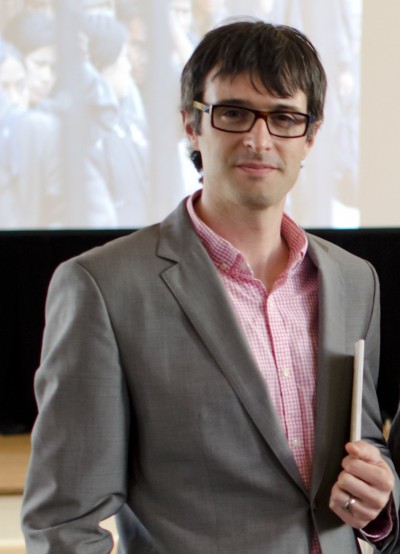University of Puget Sound Professor Brendan Lanctot examines a turbulent time of vying political forces
TACOMA, Wash. – A new book takes a provocative, fresh look at the cultural life produced during one of Argentina’s most divisive periods—the 23 years under the dictatorship of Juan Manuel de Rosas (1829–1852).
Beyond Civilization and Barbarism: Culture and Politics in Postrevolutionary Argentina (Bucknell University Press, December 2013), written by Brendan Lanctot, assistant professor of Hispanic Studies at University of Puget Sound, examines how opposing cultural groups promoted competing nationalist projects during the decades following Argentina’s independence from Spain. This political struggle was embodied in the confrontation between the prototypical strongman Rosas—a heavy-handed ruler wielding absolute powers—and a vociferous intellectual elite.
As common knowledge would have it, Lanctot observes, the period was marked by a clash between the apparently incompatible worldviews of these enemies. Most famously, the dissident Domingo Faustino Sarmiento, in his canonical Facundo (1845), dramatically described the time as a confrontation between “civilization and barbarism.”Against the grain of this binary logic, Beyond Civilization and Barbarism argues that the competing social actors of the time tended to use similar rhetorical strategies and to appeal to the same ideals of republican government, while sharing a fundamental concern with the pueblo, or people.
“In other words, this collective struggle was fundamentally modern: It was a response well beyond the familiar dividing lines marked by civilization and barbarism,” argues Lanctot. “The pueblo, or people, were the shared preoccupation of two sides who were vying to legitimize their competing political projects. In my view, this is the crucial, common ground that has been traditionally overlooked as commentators have used the phrase ‘civilization and barbarism’ as shorthand to describe the divergent experiences of modernity throughout Latin America, right up until the present day.”
In researching the book Lanctot carried out extensive archival research and scrutinized various cultural artifacts side-by-side, including canonical literary works, anonymous broadsheets, portraiture, personal correspondence, graffiti, and audiovisual materials.
Lanctot’s book, his first, is part of a series edited by Aníbal González of Yale University, called The Bucknell Studies in Latin American Literature and Theory. González writes in his forward, “This series of books provides a forum for some of the best criticism on Latin American literature in a wide range of critical approaches, with an emphasis on works that productively combine scholarship with theory.”
Brendan Lanctot, assistant professor of Hispanic Studies at University of Puget Sound, teaches Spanish and wide-ranging topics in Latin American literary and cultural studies. These include narratives of conquest, 19th-century Latin American cultural studies, contemporary film, and post-dictatorial Argentine fiction. His primary field of research concerns the intersections of literary, intellectual, and cultural history in 19th-century Latin America. He is also interested in contemporary Argentine literature and film. Lanctot’s published and forthcoming articles include studies of visual culture and graffiti in 19th-century Argentina, the relationship between literature and the public celebrations of the Argentine Bicentennial, and the novelist César Aira. Lanctot received his bachelor’s degree from Haverford College and his doctorate from Columbia University.
Press photos of the Beyond Civilization and Barbarism book cover and of author Brendan Lanctot can be downloaded from pugetsound.edu/pressphotos
Tweet this: New book by Brendan Lanctot @univpugetsound Hispanic Studies revisits Argentina’s post-revolutionary strife. Think again! http://bit.ly/1im1lJw
Follow us on Twitter! www.twitter.com/univpugetsound



